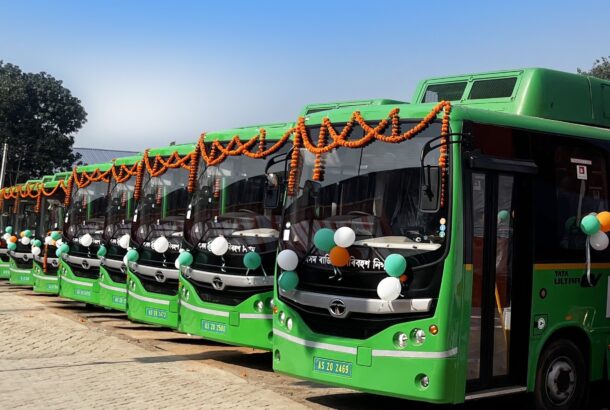Global vehicle manufacturer Tata Motors joins LeadIT.
Tata Motors, the global automotive manufacturer has become the latest member of the Leadership Group for Industry Transition (LeadIT). The Indian vehicle maker is one of the biggest in the world and its business encompasses commercial and passenger vehicles, electric vehicles and the luxury brand Jaguar Land Rover.

Tata Motors electric buses in Guwahati, India
Tata Motor’s membership of LeadIT reinforces how crucial decarbonization is at all stages of the global value chain. Demand signals are important to support a green industry transition. Tata Motors has pledged to achieve net zero emissions across its passenger vehicle business by 2040 and in its commercial vehicle business by 2045. In a statement welcoming the new partnership with LeadIT Tata Motor’s Vice President and Chief Sustainability Officer, SJR Kutty said “This collaboration will not only expedite our own transition but also catalyse a climate for change within the automotive industry. We eagerly anticipate working alongside other pioneering companies within LeadIT, creating a dynamic ecosystem of shared insights and collective advancement. Together, we aim to drive the automotive industry forward, championing a sustainable future for all.”
LeadIT 2.0 pioneering collaborative industry transition platforms
LeadIT brings together countries and companies committed to transitioning heavy industries towards net zero emissions. At COP28, a second phase, LeadIT 2.0 was announced, marking a joint commitment by member countries and companies to shape policy frameworks and international cooperation for an inclusive industry transition. A new three-year Mission Statement was adopted at the annual LeadIT Summit during COP28 where leaders committed to delivering clear and tangible results from the partnership by COP30 in 2025. LeadIT 2.0 has a focus on global dialogue, technology collaboration, and fostering industry transition partnerships.
This membership signals an important commitment to net zero from a leading global manufacturer in the supply chain. Demand signals are crucial for the transformation of our industry. Fostering dialogues and strengthening partnerships in areas where transition challenges need to be addressed is core to achieving reduced climate emissions. Industry is driving the green industrial transformation here in Sweden and we hope to inspire change globally. I look forward to seeing Tata Motors in our group of leading partners.
Romina Pourmokhtari
Minister for Climate and the Environment, Government of Sweden
It is exciting to see another leading global engineering company from India join the LeadIT coalition. Our compliments to Tata Motors for their decision to join the LeadIT group and for their commitment to help global decarbonisation efforts. India Sweden cooperation on environment and climate has a long history. Today clean technologies and sustainability platforms are an important and growing aspect of our business, technology, research & industrial innovation linkages. Ambassador Tanmaya Lal, Embassy of India, Sweden
About Tata Motors
Tata Motors, which is part of the multi billion dollar Tata Group, has operations in India, the UK, South Korea, Thailand, South Africa and Indonesia. It markets its vehicles globally and as of March 31, 2023, Tata Motors’ operations include 88 consolidated subsidiaries, two joint operations, three joint ventures, and numerous equity-accounted associates, including their subsidiaries.. It is India’s market leader in commercial vehicles and ranks among the top three in the passenger vehicles market.
Read our interview with Tata Motor’s Vice President and Chief Sustainability Officer, SJR Kutty where he explains why being a member of LeadIT is important to the company’s net zero ambitions and the challenges he sees in achieving that goal.

Mr SJR Kutty, Vice President & Chief Sustainability Officer, Tata Motors
Why did Tata Motors want to join LeadIT?
We are committed to becoming a net zero company by 2045 (PV business by 2040). Given the automotive industry’s challenges in emissions reduction, collaborative efforts are essential to meet this ambitious goal. LeadIT serves as a platform where like-minded entities and policymakers can unite, leveraging collective expertise to make substantial progress. We anticipate LeadIT becoming a fertile ground for nurturing collaboration in pioneering technologies and innovation.
What does Tata Motors see as the importance of supply chain decarbonization?
At Tata Motors, we consider supply chain decarbonization as pivotal for creating a more sustainable and competitive business ecosystem. It is thus an integral part of our decarbonization strategy. Beyond environmental benefits, decarbonizing the supply chain enhances resilience, mitigating risks associated with climate change disruptions while stimulating innovation and operational efficiency, positioning us for continued success in a dynamic marketplace.
What will Tata Motors bring to LeadIt as a member?
We are making significant strides across zero-emissions products, renewable electricity, water neutrality, circular economy, and biodiversity. We are happy to share the knowledge and insights gained from our journey. Also, the role of technology is pivotal in the transition of our industry, we are happy to embrace multilateral collaborations on pioneering technologies as a means to drive progress
What do you see as the main challenges specifically in the automotive sector when it comes to achieving a just industrial transition?
Some of the hurdles in achieving just transition include, Workforce Reskilling ; The transition to electric vehicles (EVs) and other sustainable technologies requires a shift in workforce skills. This may entail retraining employees who are currently engaged in traditional automotive manufacturing processes to adapt to new technologies and processes, Economic Impact on Traditional Automotive Sectors; Regions and communities that heavily rely on traditional automotive manufacturing which can be mitigated by planning for an orderly transition, in a measured manner so as to see the transition as an opportunity for growth and properity while still enabling a resilient planet.
